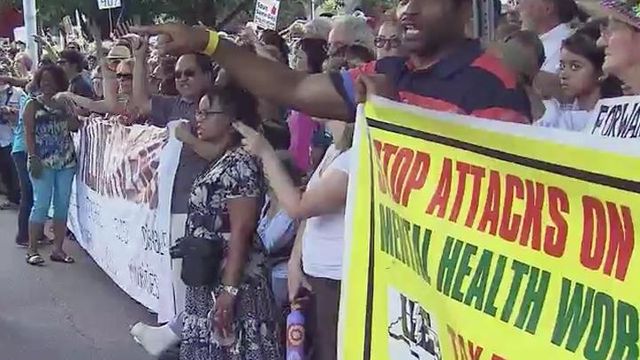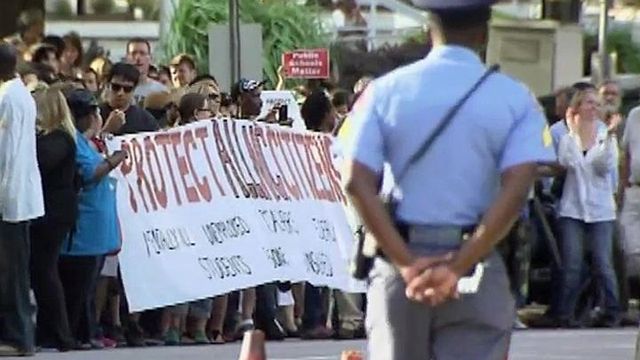'Moral Monday' protests have unintended impact
Over the past six weeks, more than 300 people have been arrested in a series of protests at the North Carolina General Assembly - a move that some observers say has had no immediate political impact and has only put a strain on Wake County's already overburdened court system.
Posted — UpdatedThe North Carolina chapter of the National Association for the Advancement of Colored People has been organizing the so-called "Moral Monday" protests, which have drawn hundreds of people to the state legislative building on West Jones Street to protest what demonstrators say is a Republican-backed regressive agenda on social programs, voting rights, education and tax policy – actions that disproportionately hurt the poor and minorities.
Monday's demonstration resulted in 151 arrests – three times the number of people arrested in previous weeks.
Lawmakers including Sen. Neal Hunt, R-Wake, have taken note but say the mass arrests aren't affecting what's going on inside the legislature.
"They certainly have an opportunity and privilege and voice opinions, but I don't think it'll make a difference though," Hunt said. "It's basically a total difference in philosophy. We think that free enterprise is the best way to go to make sure people have the motivation to do the best they can for themselves. The other side is government needs to do more and more."
That's not surprising to Steve Greene, associate professor of political science at North Carolina State University. He says protests are usually the only hand people in the political minority can play.
"And they don't usually work, because you're stuck on the outside," Greene said. "You don't have rich lobbyists and everybody in the legislature who's going to listen to you."
Still, Green says the protests can affect public opinion in the next election. That's something state NAACP President Rev. William Barber hopes will happen.
"The people are listening, they're the ones who are going to the polls," he said.
But that's more than a year away, and the arrests have already had significant impacts on law enforcement and the judicial system.
After the first four weeks of protests, General Assembly Police had spent an additional $11,000 in personnel costs, and the Raleigh Police Department, which has been involved in the arrests and transportation of protesters, had spent an extra $16,000 on staff.
The City-County Bureau of Identification, Wake County Detention Center and Wake County Magistrate's Office have also had to bring in additional staff to book protesters.
The cases then end up in Wake County courtrooms, where, Wake County District Attorney Colon Willoughby says the prosecutorial staff and judges have to look at each case individually and see it through the court system.
"If we have to try all of these cases, it will take weeks and weeks of court, of judge time, of prosecutor time," Willoughby said.
He fears the number of people arrested could more than triple by the end of the legislative session this summer.
"By the time the General Assembly recesses, we may have a thousand cases pushed into a system that is already strained," Willoughby said.
For him, he said, it's not about politics but about pragmatism.
"I don't think the people who are doing this understand what they're doing to the system," Willoughby said. "They're not punishing the General Assembly. The General Assembly is not hurting because of this. The people who are getting punished are the citizens of Wake County."
But Barber said he thinks the costs of the arrests to the taxpayers are minor compared to the cost of raising taxes on 80 percent of North Carolinians.
"We're not going to allow 86 (Republican lawmakers) to drive our economy into the ditch," Barber said.
• Credits
Copyright 2024 by Capitol Broadcasting Company. All rights reserved. This material may not be published, broadcast, rewritten or redistributed.






